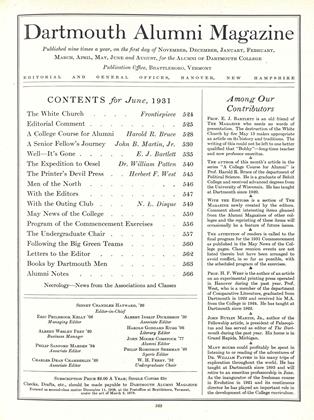Yale, in taking the same attitude on The Classics that Dartmouth took beginning with the class of 1929, provokes these two viewpoints:
YALE JOINS THE PARADE
Education in America has taken some stalwart strides forward since the days of John Harvard, Eli Yale, and Eleazar Wheelock. The ancients were to a man of the school of conservative educational doctrine which postulated that the raison d'etre of advanced education was not so much to give practical information as mental exercise, and that in training the mind nothing was better than a straight four year dose of Latin, Greek, Arabic, or Hebrew.
Last June Princeton announced the abandonment of compulsory Latin as a requirement for the Bachelor of Arts degree. This week comes the proclamation of the Yale faculty to the effect that the degree of Bachelor of Philosophy now offered by the university is to be dropped and that the degree of Bachelor of Arts is to be awarded all graduates of Yale College, the academic department of the university. Under the terms of this ruling, the whole range of curricula available to candidates for the Ph.B. as well as the requirements for that degree are to be transferred to the A.B. Previous to this, candidates for the A.B. had to present three years of Greek or four of Latin for admission, and were compelled to continue with one of these subjects for at least one year in college. When the new program takes effect, the undergraduate of more practical tastes will be able to avoid Greek or Latin by virtue of a clause in the former Ph.B. requirements which provides that a course in classical civilizations may be substituted for the Latin and Greek postulated in the old A.B. requirements.
At least two far-reaching effects of this action may be expected. In the first place Latin and Greek will have to stand or fall on their own merits. No longer will the classics be artificially fostered by the alma mater's sustaining palm. They will last, if they do, for the beauty of their rhythms and wordpatterns, and as a result of the work of their creators: Horace, Virgil, Homer, Euripides, and names like these.
Another result will be unquestionably the falling off in popularity of these studies in secondary schools throughout the country. The educational prestige of Yale University is as great a factor as exists in American institutions of higher learning today. That Yale, the quondam seat and stronghold of the classics, should announce a modification of her classical requirements will greatly influence not only those men preparing for Yale, but also those who would normally take classical courses under the influence of tradition.
—The Dartmouth—May 13.
 View Full Issue
View Full Issue
More From This Issue
-
 Class Notes
Class NotesCLASS OF 1930
June 1931 By Albert I. Dickerson -
 Article
ArticleA Senior Fellow's Journey
June 1931 By John Butlin Martin, Jr. -
 Class Notes
Class NotesCLASS OF 1929
June 1931 By F. W. Andres -
 Article
ArticleThe Dartmouth Expedition to the Island of Oesel
June 1931 By Wm. Patten -
 Class Notes
Class NotesCLASS OF 1910
June 1931 -
 Lettter from the Editor
Lettter from the EditorEditorial Comment
June 1931







